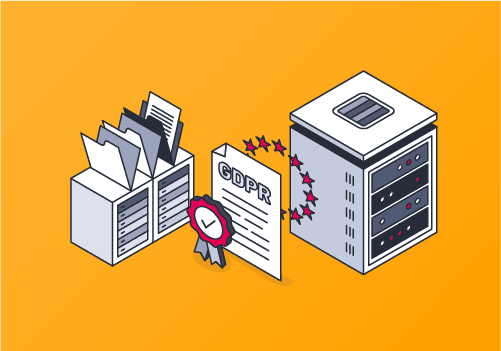Artificial intelligence and GDPR – managing the data protection challenges
This article provides a comprehensive overview of the GDPR, its main provisions and its challenges in relation to artificial intelligence.

For the past six years, the GDPR has presented significant challenges for businesses, authorities, and organizations alike. With the rapid rise of artificial intelligence (AI), data protection requirements have grown increasingly complex, making the adoption of advanced digital systems virtually essential.
Introduced in 2018, the General Data Protection Regulation (GDPR) raised data protection standards across the European Union (EU) to new levels. More than six years later, its relevance has only grown, as rapid technological advancements means that an ever-increasing amount of personal data is being collected.
Artificial intelligence, now pervasive across nearly every industry, plays a pivotal role in this context. The principle is clear: the more high-quality data available, the better AI algorithms can be trained to identify patterns and deliver accurate predictions. As a result, vast amounts of personal information are fed into AI systems daily. Under the GDPR, this personal data must alsobe processed responsibly.
What Does the GDPR Define as the Processing of Personal Data?
Personal Data:
Any information that relates to an identified or identifiable individual. This includes details such as a name, address, email address, IP address, and similar identifiers.
Processing:
Any action performed on personal data, whether automated or manual. This encompasses a wide range of activities, including collection, recording, storage, adaptation, alteration, retrieval, consultation, use, disclosure of transmission, dissemination, or otherwise making available of personal data.
What Legal Principles Does the GDPR Establish for Data Processing?
The GDPR establishes several core principles that organizations must adhere to when processing personal data:
- Lawfulness, Fairness, and Transparency:
Data must be processed in a lawful, fair, and transparent manner, ensuring individuals understand how their data is used. - Purpose Limitation:
Data can only be collected and processed for specific, explicit, and legitimate purposes. - Data Minimization:
Only the minimum amount of data necessary for the intended purpose may be collected. - Accuracy:
Personal data must be accurate, complete, and kept up to date where necessary. - Storage Limitation:
Data may only be retained for as long as required to fulfill its intended purpose. - Integrity and Confidentiality:
Data must be processed securely, with measures in place to protect against unauthorized access, unlawful processing, accidental loss, destruction, or damage.

Our comprehensive checklist for a successful GDPR audit will guide you through each step of the process—from preparation and risk management to reporting.
Data in AI Solutions: Additional Requirements Under the EU AI Act
In response to rapid technological advancements, lawmakers have introduced additional regulations to govern artificial intelligence. The EU AI Act, effective since August 1, 2024, complements the GDPR by establishing further criteria for data processing in AI systems.
Among its provisions, the Act mandates new mechanisms for tracking and documenting data processing activities when using AI. These requirements apply not only to AI developers but also to companies implementing third-party AI solutions. Organizations must ensure that data processed by AI systems is handled responsibly, aligning with ethical standards and mitigating data protection risks.
Recommendation: Combine Responsibility for GDPR and the EU AI Act
A closer look at the GDPR and the EU AI Act reveals that both regulations share a similar logic. They both adopt a risk-based approach and require comprehensive documentation of all data processing activities. To comply, companies must effectively manage third-parties and collaboration with internal stakeholders (to obtain relevant information). Additionally, both regulations demand robust governance structures to facilitate the necessary documentation.
Given these similarities, it makes sense for organizations to consolidate responsibility for both areas. This also has the advantage that the inclusion of artificial intelligence in data protection measures can be based on processes that have already proven themselves during GDPRimplementation.
Automating Data Protection Processes with Digital Tools
As data protection challenges grow more complex with the integration of artificial intelligence, automating processes offers an effective solution. Digital tools, such as the EQS Privacy Cockpit, ensure companies fully comply with both the GDPR and the EU AI Act.
To avoid data protection violations and maintain the highest security standards for all data, an integrated solution should include the following key features:
- Automated Compliance Checks: Continuous monitoring to ensure adherence to all relevant regulations.
- Risk Management: Early identification of potential threats and an assessment of risks related to the handling of data and AI systems.
- Comprehensive Documentation: Detailed reports that support internal and external audits.
- Privacy by Design: Tools that facilitate compliance with data protection from the start of aproject’s planning phase.
The Bottom Line
Artificial intelligence is poised to become increasingly prevalent, presenting both challenges and opportunities for the compliance sector. On one hand, AI can help manage growing requirements; on the other, it introduces new risks if fed with inaccurate or manipulated data. Regular reviews of AI systems are therefore crucial.
The GDPR provides a robust framework for personal data protection, which the EU AI Act builds upon. By ensuring transparency and adhering to these regulations, companies can not only avoid legal repercussions but also enhance customer trust.

With the EQS Privacy COCKPIT, ensure full compliance with all data protection regulations, including the GDPR and AI laws.




